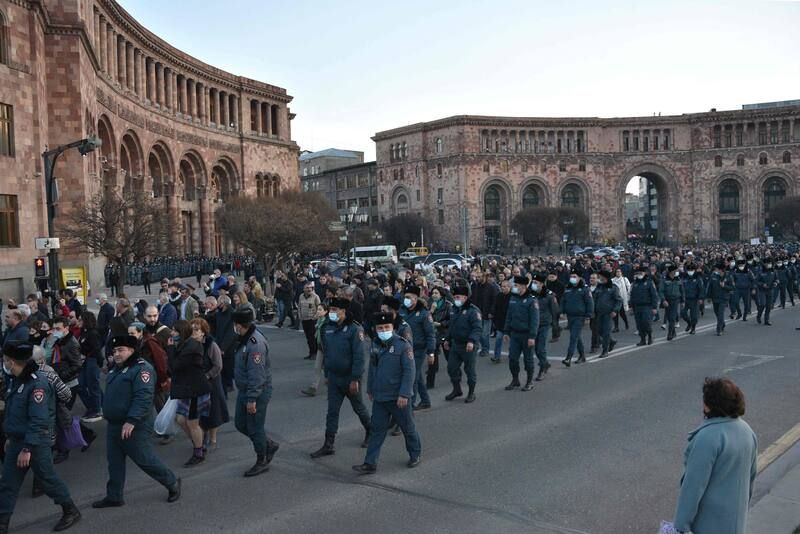
Despite a nudge from a senior State Department official, Azerbaijan has so far refused to return more than four dozen Armenian prisoners who were captured after a bloody war for control of the disputed enclave known as Nagorno-Karabakh.
The prisoner issue is a bitter legacy of the battle last fall in which Azerbaijan’s forces, backed by Turkish-made drones, regained control of much of the mountainous region that is officially part of Azerbaijan but had been governed by its majority-Armenian population since a 1994 war for independence. Armenia says it lost more than 4,000 soldiers — a huge number for the small, embattled nation.
Russia brokered a peace deal last November and dispatched peacekeeping troops, reinforcing its dominance in the Caucasus region. But aftershocks of the conflict continue to reverberate, especially in Armenia, where Prime Minister Nikol Pashinyan — whose government was rocked by the military defeat — faces parliamentary elections in June.
U.S. officials say that 52 Armenians are still held by Azerbaijan, despite earlier exchanges of prisoners. The government in Baku claims that these detainees were not combatants in the war but entered the disputed territory in late November after the cease-fire and are terrorism suspects, an allegation that Armenia denies.
Philip Reeker, acting assistant secretary of state for Europe, raised the issue of the captives with Azerbaijan’s foreign minister, Jeyhun Bayramov, during a telephone call in February and requested that the International Committee of the Red Cross be allowed to visit the prisoners. The ICRC was promptly granted access.
U.S. officials continued in the following weeks to advocate the release of detainees. “We hope to see more detainees released,” said a senior Biden administration official. “We’re not negotiating, but we’re urging them to exercise goodwill,” he said, noting that implementing the cease-fire and prisoner swaps was Russia’s responsibility, as mediator between the combatants.
Observers had hoped that Azerbaijan might release the Armenian captives as a goodwill gesture at the time of the Nowruz holiday on March 20. Azerbaijan’s president, Ilham Aliyev, granted amnesty for 148 captives, including journalists, opposition politicians and human rights activists. But the Armenian detainees remained in custody.
“The Azerbaijanis have been pressing their false narrative that these people are not POWs but criminals because they were captured after the war,” Varuzhan Nersesyan, Armenia’s ambassador to Washington, said during an interview. Nersesyan said that since the war ended Nov. 10, “there has been no real attempt at normalization or reconciliation” by Azerbaijan. For that reason, he argued, the three co-chairs on the Minsk Group that oversees diplomacy on Nagorno-Karabakh, — the United States, France and Russia — should all remain involved.
Members of Congress have begun to press Azerbaijan on the issue. A group led by Rep. Adam B. Schiff (D-Calif.), the chairman of the House Intelligence Committee, introduced a bill March 16 calling on Azerbaijan to immediately release all Armenian POWs and captured civilians. The measure has 42 co-sponsors in the House.
“It is unacceptable that more than 100 days after the end of the war in Nagorno-Karabakh . . . Armenian service members and civilians remain in Azerbaijani custody, where little is known of their condition, treatment, or well-being,” Schiff said in a statement when the bill was introduced.
Human Rights Watch issued a report on March 19 alleging that Azerbaijani forces had abused Armenian POWs after the war, based on interviews with four former prisoners. Nersesyan, the Armenian ambassador, argued that Azerbaijani forces have also been destroying or damaging churches and religious artifacts in areas they captured during the war.
Elin Suleymanov, Azerbaijan’s ambassador to Washington, said during an interview Monday that Azerbaijan rejected the Human Rights Watch findings but that any serious allegations of prisoner mistreatment would be investigated. He also disputed accounts of damage to Armenian religious sites and cited counterclaims of past damage to Azeri mosques. “There is a lot of pain on both sides, and we need to acknowledge that,” he said.
The prisoner issue will gain additional emotional significance in April, the month when Armenians annually commemorate the mass killings that took place in 1915. Ian Bremmer, a prominent international commentator, tweeted recently that Turkish President Recep Tayyip Erdogan “will be incensed by the Biden administration’s move to acknowledge the Armenian genocide.”
An administration official queried Monday responded: “As a presidential candidate, President Biden commemorated the 1.5 million Armenian men, women, and children who lost their lives in the final years of the Ottoman Empire. He said then that we must never forget or remain silent about this horrific campaign. We will forever respect the perseverance of the Armenian people in the wake of such a great tragedy.”
Another administration official said a final decision about formal presidential recognition of the massacre hasn’t been made yet. This year’s commemoration will be especially poignant because of Armenia’s defeat in the Nagorno-Karabakh war last year, and the anguish that followed.
David Ignatius writes a twice-a-week foreign affairs column for The Washington Post. His latest novel is “The Paladin.”
